15 Standout Online Community Software Solutions for 2026
Explore the top options.

Building and maintaining an online community is one of the most effective ways to stay connected with your audience. Whether you’re running a professional association, managing a customer base, or creating a space for peers to share knowledge, a strong community can help you strengthen relationships and create a sense of belonging among your members.
Using a sophisticated platform to create your branded online community is crucial—especially in an era of social media and artificial intelligence. But as more online community platforms enter the market, it isn’t always easy to figure out which one fits your needs. In this post, we’ll break down:
- What Is Online Community Software?
- Why Do Organizations Need Online Communities?
- Benefits of Using Online Community Software
- What to Look for in a Community Management Platform
- Top Online Community Software Platforms
- Other Options for Creating Online Communities
- How to Choose the Right Community Portal Software
Any of the solutions listed here will help you create a space of trust, reliability, and ongoing thought leadership for your brand, but the right software can take your community to new heights. Let’s dive in and find your organization’s perfect fit.
Searching for the best online community software? Look no further.
Demo the #1 solution: Higher Logic.
What Is Online Community Software?
Online community software is a type of technology that enables associations, businesses, and other organizations to build robust, engaging online hubs where their members or customers can interact.
Within online communities, members can easily connect with their peers, participate in discussions, explore resources, and give feedback on your offerings. Community software allows you to create this space for members and continually improve it to provide the best experience possible.
Why Do Organizations Need Online Communities?
Connecting with your audience is essential, whether you work for an association, B2B or B2C company, or nonprofit. And to successfully engage your members, it’s important to understand how today’s digital-native audiences like to connect in an increasingly saturated online environment.
Online community platforms bring people together around a shared interest or goal, without necessarily asking them to participate in in-person events. They also cut through the noise, giving members access to personalized recommendations and vetted resources. Amid all of the inaccurate advice from social media and stagnating AI-generated content, a trusted online community is extremely valuable.
In your community, your audience finds a place to exchange knowledge, ask questions, collectively problem solve, celebrate milestones, and support one another. Meanwhile, your organization gets a new way to provide value that can’t be replaced by AI, member insights that might otherwise go unnoticed, and a highly engaging communication channel. All of this results in a more responsive and connected experience for everyone involved.
Types of Online Communities
Online communities come in all shapes and sizes, depending on what your organization does and what your goals are. Common types of online communities include:
- Association member communities
- Customer communities
- User group or technical support communities
- Communities of practice (i.e., groups that come together to solve common problems in their careers)
- Creator or artist communities
- Employee (internal) communities
- Learning and networking communities
- Open-source or self-hosted communities
- Social media communities
Before jumping into platform comparisons, it’s important to clarify what type of community you’re trying to build. If you’re unsure which of these types most closely aligns with your goals, our overview of community platform types breaks down the key categories to help you choose a direction.
Benefits of Using Online Community Software
It’s difficult to create a full-featured online community from scratch, and most organizations don’t have the necessary time or technical knowledge to make it worthwhile. That’s where an online community software platform comes in.
With an intuitive platform, you can easily design a branded community that helps you:

- Boost member or customer engagement. Online community software makes it easier to keep your audience engaged between finite interactions like events or educational programs. Instead of waiting for the next email campaign or annual conference, members can participate in ongoing discussions, ask questions, and connect with peers anytime they want.
- Get actionable insights and feedback. By observing what people are discussing, what questions come up most often, and where they’re spending time, you can better understand your audience’s needs. Community platforms help you gather feedback naturally and identify opportunities for improvement, whether it’s a new feature, resource, or support process.
- Enable easy peer-to-peer support and knowledge sharing. Online communities unlock the collective intelligence of your audience, allowing members to support and educate each other. For associations and nonprofits, members can share best practices, tips, and resources, increasing membership value. For B2B and B2C companies, online communities can reduce support costs and increase customer satisfaction as users help each other solve problems.
- Deliver personalized experiences. Modern platforms often include features that let you tailor community content based on member data, recommend relevant discussions, and segment your audience for better communications. That means you get to make the experience feel more personalized without having to do everything manually.
- Amplify marketing and advocacy. A thriving community turns your members or customers into advocates who share content, refer others, and promote your brand organically. Community software helps energize volunteers and champions to support advocacy and recruitment efforts. Plus, it gives you a source of user-generated content and word-of-mouth marketing to reach new audiences.
What to Look for in a Community Management Platform
There are many types of online community platforms, so it’s best to start your search with a clear understanding of what you’re looking for. For instance, some solutions are designed specifically for associations or enterprises and offer robust features for member management. Others are geared towards creators, internal teams, or niche interest groups, and these platforms tend to prioritize simplicity and affordability.
Once you’ve found community portal software that aligns with your audience’s needs, zero in on the specific features it offers. Look for solutions with:
- Intuitive, easy-to-use interfaces for both members and administrators
- Native mobile apps so members can access all features from their phones
- Customizable branding
- Discussion boards and Q&A options
- Resource libraries
- Event management tools, including registration, hosting, and livestreaming
- AI-powered features like chatbots and automated personalization
- Personalized marketing messages and campaigns
- Compliant, secure payment processing
- Data analytics features to help you understand user behavior
- Integrations with other essential tools, like your AMS or CRM
Depending on your goals for your online community, you might also seek out features like gamification tools, interactive polls, course creation, and monetization options. Determine which features are must-haves for your organization and which ones may be lower priority or “nice-to-haves.”
Top Online Community Software Platforms
Now that you understand the basics, let’s explore some of the best online community platforms you can consider for your engagement strategy. Check out our quick breakdown below or click a provider to read a more in-depth review.
|
Platform |
Best For |
|
Associations & member-based orgs |
|
|
B2B & B2C companies |
|
|
Educators & course creators |
|
|
Lifestyle & wellness brands |
|
|
Alumni networks |
|
|
Influencer communities & small businesses |
|
|
Small trade associations |
|
|
Early-stage startups |
|
|
Communities of practice |
|
|
Enterprise companies that use Salesforce |
|
|
SaaS companies |
|
|
Enterprise businesses focused on peer-to-peer support |
|
|
Early-stage & informal communities |
|
|
Orgs with unique needs |
|
|
Orgs that aren’t ready to invest in new software but have dedicated staff to cultivate community |
1. Higher Logic Thrive
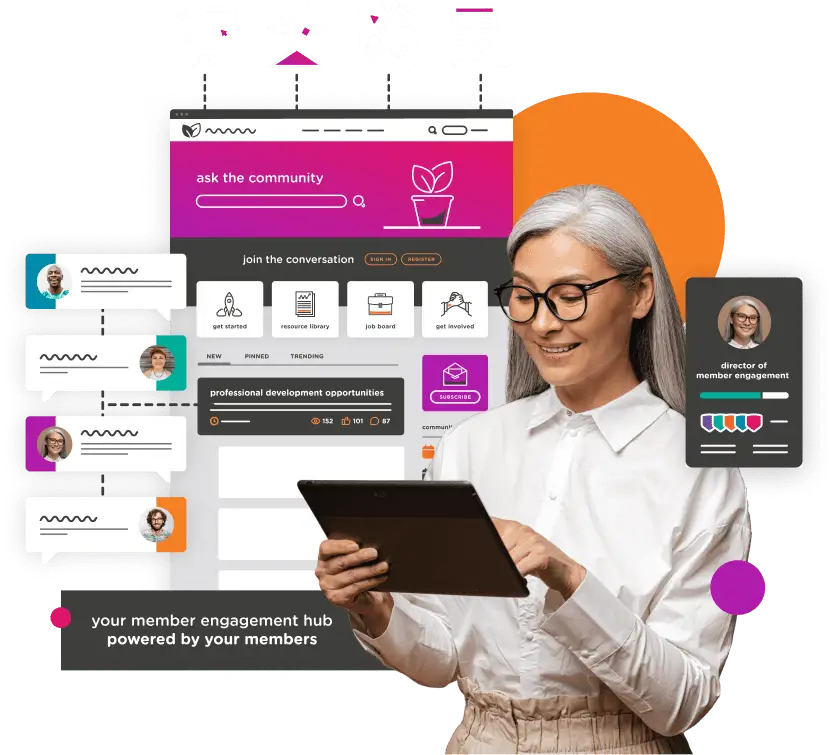
Best for: Associations and member-based nonprofits that need a scalable, full-featured platform to manage community engagement and communication on a large scale
Higher Logic Thrive is a leading online community platform purpose-built for associations and member-driven organizations. It stands out for helping teams build thriving member communities that drive long-term engagement, support member retention, and create real value through community. Our all-in-one platform includes everything you need to build a branded online community and connect with your members in the ways that matter most to them.
Trusted by over 1,700 associations worldwide and powered by almost 20 years of sector expertise, Higher Logic Thrive is the perfect fit for any member-based organization looking to host a captivating online community. Check out this video to see what our solution looks like in action:
While it comes at a higher price point than some alternatives, Higher Logic Thrive is designed to deliver long-term value without “nickel-and-diming” organizations for features or their number of users. This makes it a smart investment for organizations that need more than a basic forum. Choose between our Community or Marketing solutions to fulfill those specific needs, or select the full member engagement platform for the complete, integrated experience.
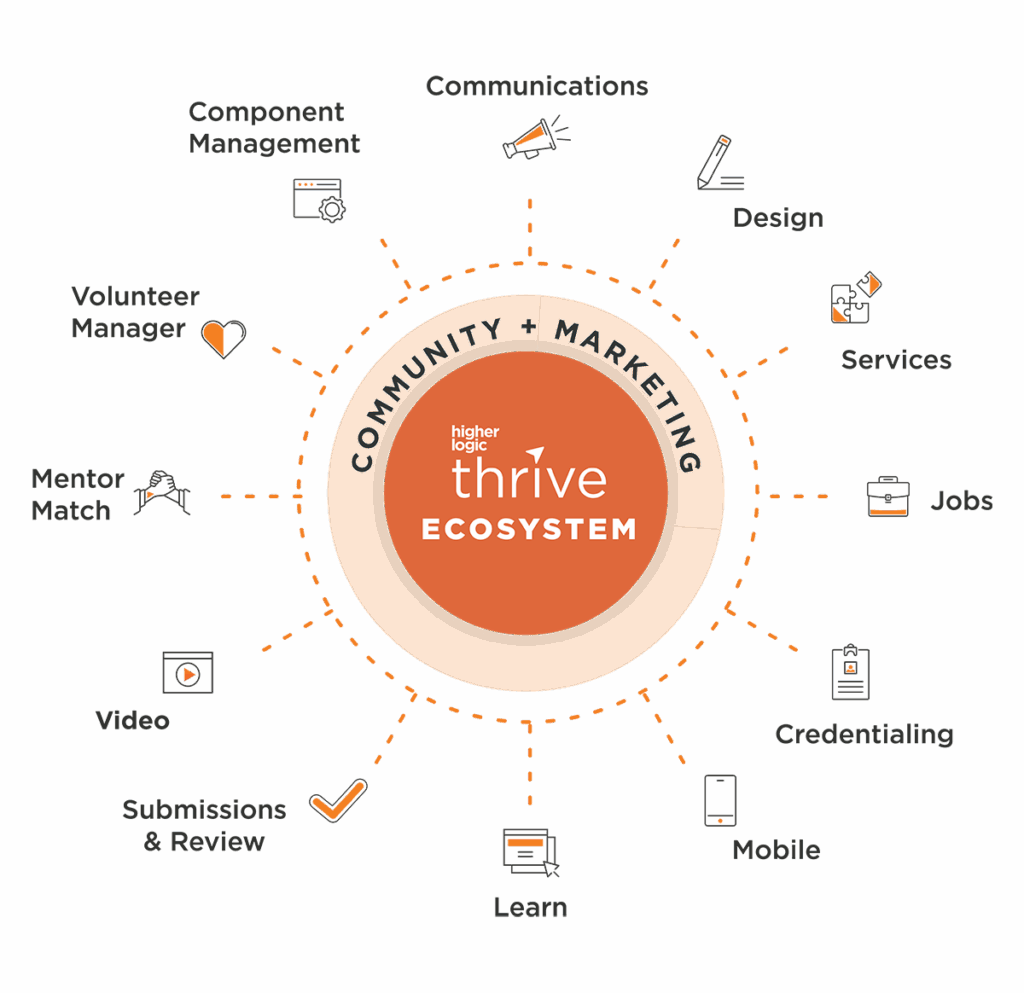
Plus, we offer professional Advisor Services to ensure your association can use the platform to its fullest potential. We’ll pair you with a community strategy expert to support your team’s understanding of the product and long-term member engagement strategies. You can also choose to add on additional advisor support for one-time projects, long-term efforts, or custom design.
Top Features
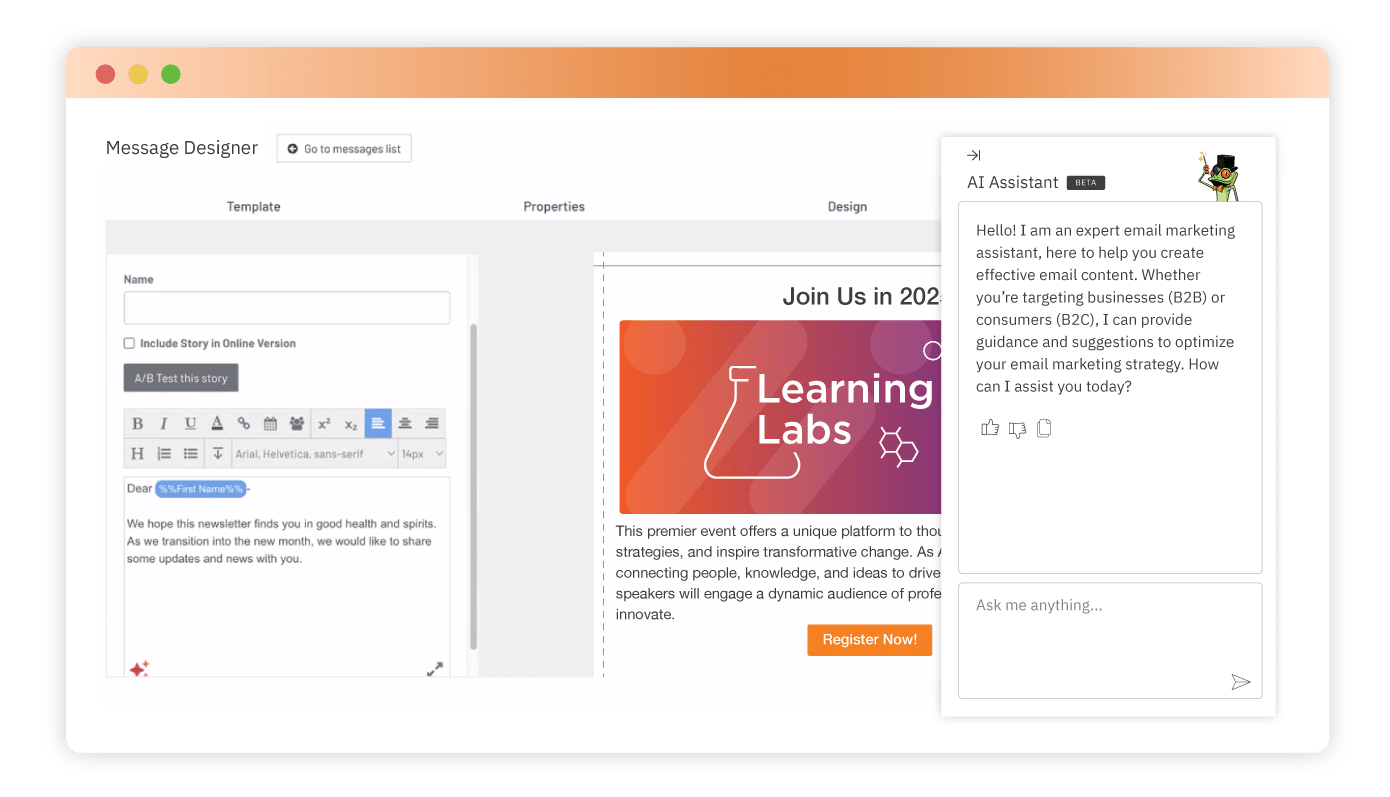
- Intuitive, clean design for your online community
- Modern, social-media-style feed
- Discussions, Q&A, and forums
- Accessible, collaborative resource libraries
- Gamification tools like badges, ribbons, and leaderboards
- Automated Smart campaigns to re-engage members
- Personalized, AI-driven community digests and newsletters
- Email with an industry-leading 99% deliverability rate
- AI-powered search assistant that provides conversational answers to member questions, making your content easy to access
- Built-in job board and event management
- Insight tracking and complete member journey analytics
- Seamless integrations with best-in-class solutions, including AMS, LMS, and analytics providers.
- Optional add-ons (often built with industry-leading partners) for mentoring and volunteering, learning management, chapter and component management, credentialing, and more.
Pricing
Higher Logic Thrive offers three core product packages with flexible pricing designed to fit your association’s needs. No matter which product(s) you pick, our pricing structure always gives you unlimited admins, contacts, members, and usage at a flat, annual fee. Contact our team today to get a custom quote.
Higher Logic Thrive is the most trusted solution in the association community space.
Join the 1,700+ associations that agree.
2. Higher Logic Vanilla
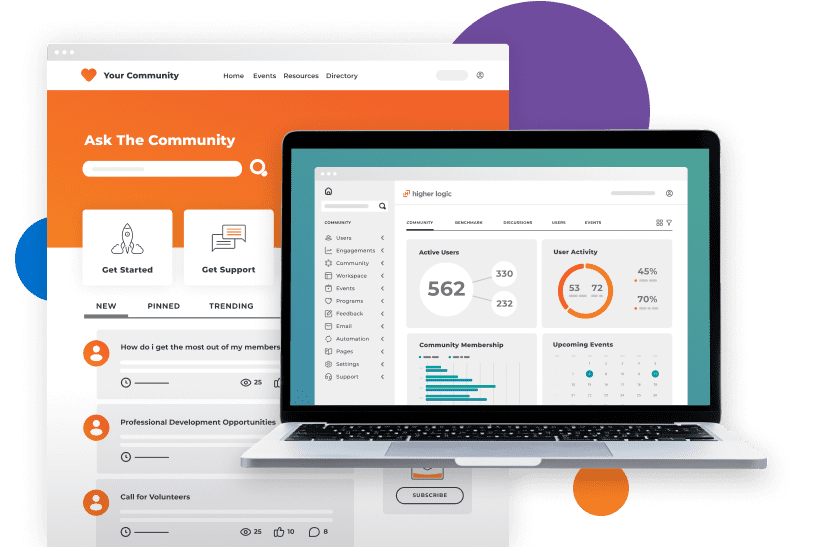
Best for: B2B and B2C companies looking to build online customer communities that drive engagement, advocacy, support, and product development at scale
Higher Logic Vanilla is a community-first platform designed to meet the needs of B2B and B2C companies, whether they aim to engage customers, reduce support costs, source product ideas, or empower brand advocates. Any company can leverage our easy-to-use tools to build branded, scalable customer success communities that drive better business outcomes.
Design robust online communities with simplified layout editing tools and an extensive library of widgets to build out your pages. Then, start engaging customers with polls, resources, badges, discussion forums, events, and more—all while monitoring activity and analyzing participation data.
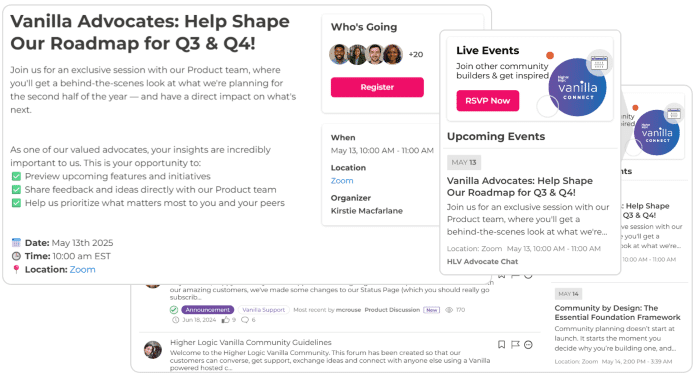
Top features
- Simple, drag-and-drop editing tools to design your branded community
- Developer toolkit for deeper community customizations
- Accessible, mobile-friendly interface that improves user experience
- Q&A and discussion boards for customers
- Searchable, crowdsourced support and collaborative knowledge bases
- Virtual events and networking opportunities
- Polls and other product feedback collection tools
- Centralized library for training guides, onboarding videos, and help resources
- Ideation space where users can submit, vote, and comment on product ideas
- Personalized member activity feeds, notifications, and email digests
- Pre-built and custom reports for analyzing user behavior
- Ability to create custom subcommunities for different member groups
- Community management dashboard and automated moderation workflows
Pricing
We offer three packages (Essentials, Corporate, and Enterprise) with personalized pricing to fit your company’s unique needs. To get a quote for your business, schedule a demo and meet with our team.
3. Circle
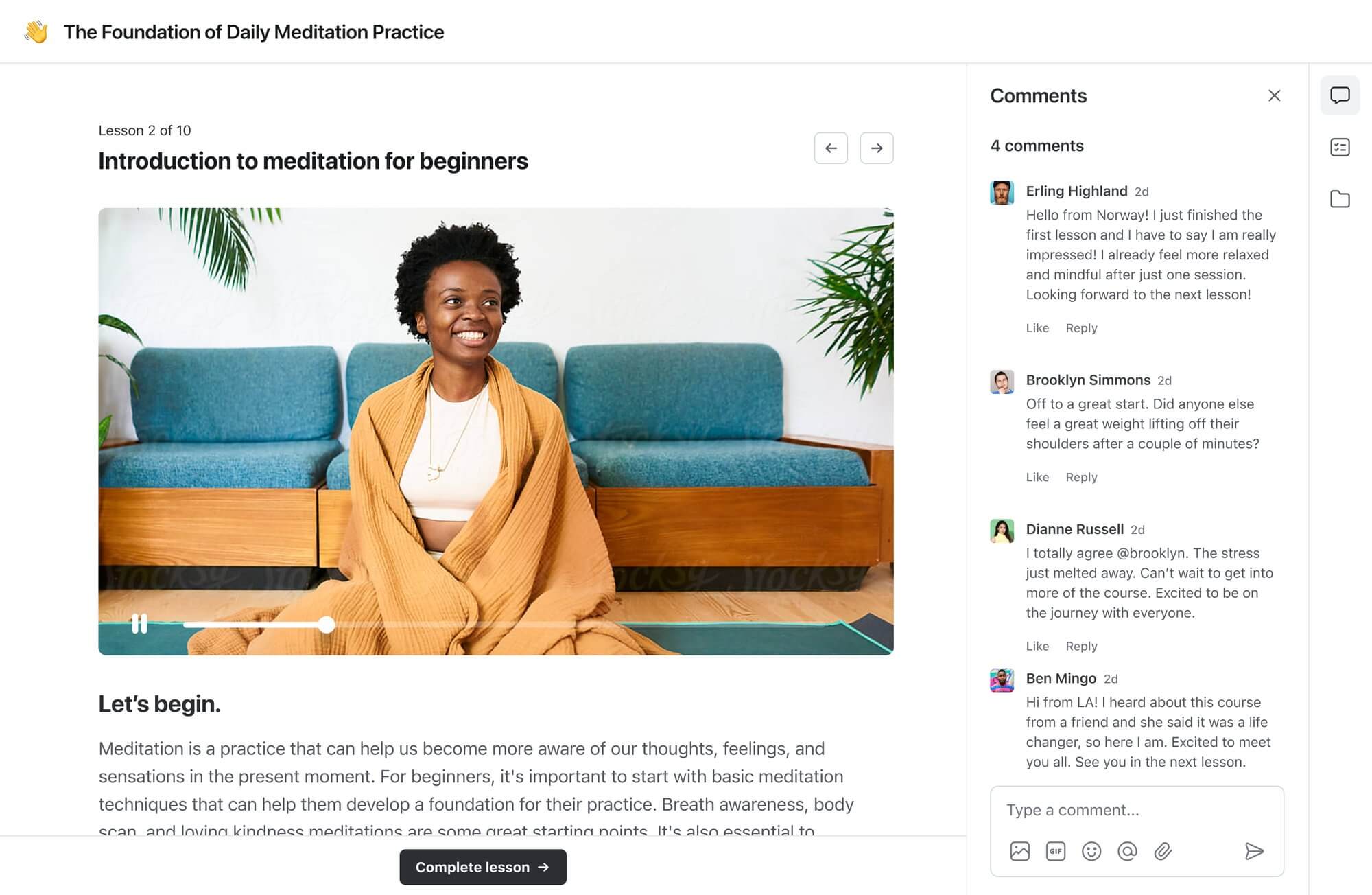
Best for: Educators and online course creators
Circle is an online community platform that markets itself as an “all-in-one” professional solution. In addition to online community features, it offers a CRM, video conferencing, a branded app, and course creation and management. The latter makes it especially compelling for educational communities that invite members to learn online.
Because Circle is such a large platform, however, not all of its features are as robust or specialized as other solutions. Specifically, user reviews cite “useless automations,” limited analytics, cluttered UX design, and plenty of bugs that take up users’ time to solve or workaround.
Top features
- Custom learning experiences with student course dashboards
- Native video hosting and recorded livestreams
- Member directory with filters and location support
- Branded iOS and Android app with custom layouts
Pricing
For the most basic plan, Circle’s pricing starts at $89 per month with a 14-day free trial. However, each package comes with a limited number of administrators and moderators, so you have to pay extra for each additional person who needs access.
4. Mighty Networks
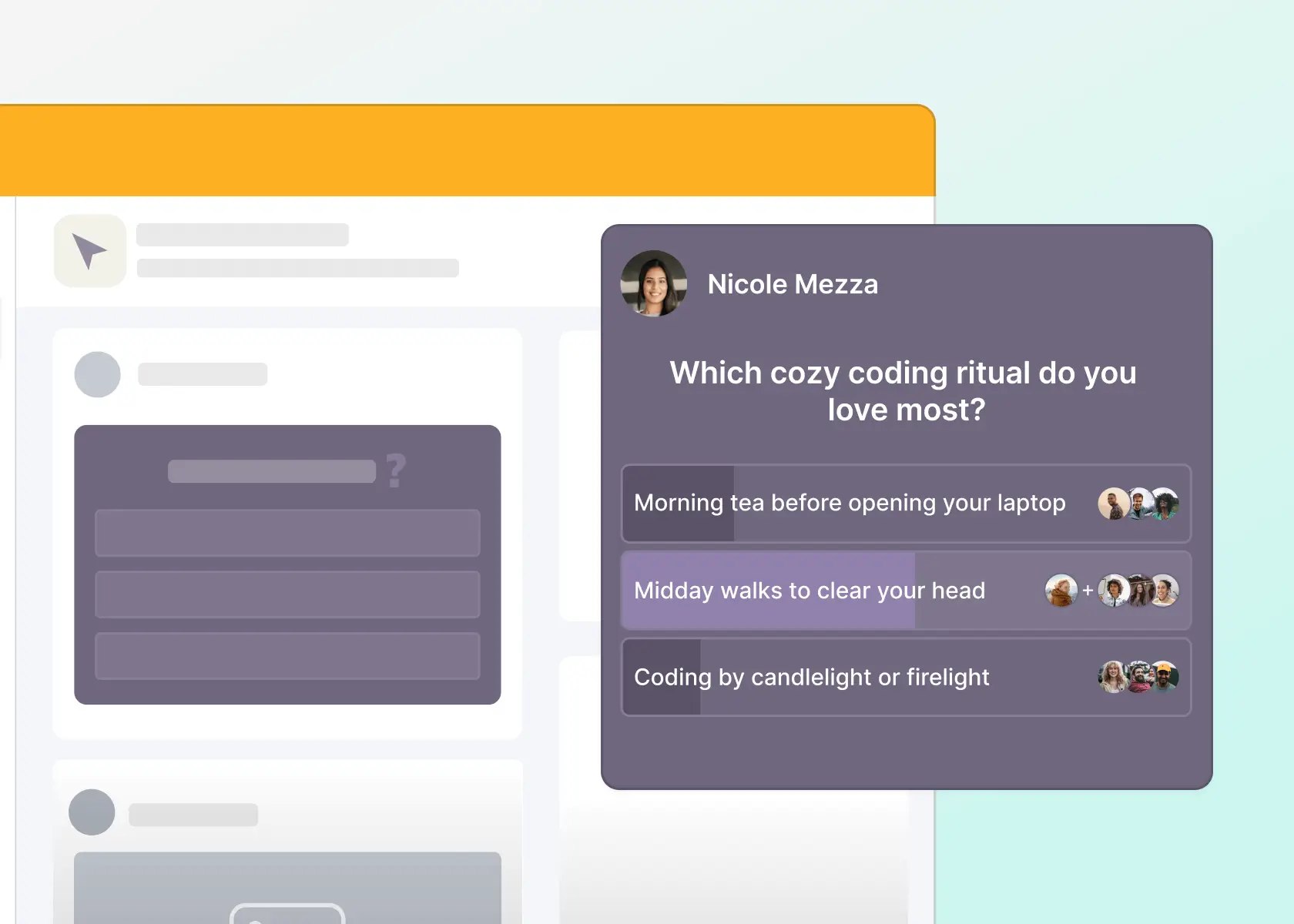
Best for: Lifestyle and wellness brands
If you’re looking for a relaxed, wellness-friendly online community software solution, consider Mighty Networks (or Mighty, for short). This platform offers an especially social media-like experience for members who want to share stories and connect with like-minded people online. Mighty boasts “profiles that look so good we should be a dating app” and features like messaging streaks that mirror social media platforms.
Some Mighty clients have mentioned that its sales pages and monetization options are lacking, while others say that the interface is clunky and challenging to navigate. If you want to save your team headaches, it might be worthwhile to consider more intuitive options.
Top features
- Social media-inspired activity feeds and gamification features
- “AI Cohost” that generates polls, conversation starters, lesson suggestions, and more
- On-demand and cohort-based courses and challenges
Pricing
Mighty plans range from $49 to $360 per month, with custom pricing for packages that include branded apps. All plans include unlimited hosts, moderators, and members.
5. Hivebrite
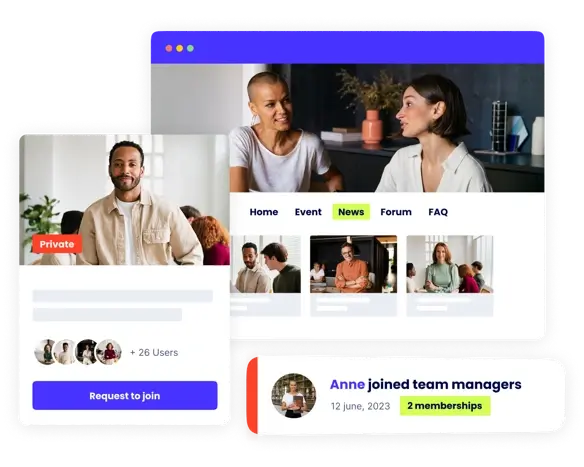
Best for: Alumni groups and educational institutions
Hivebrite is another community software option with basic features for smaller organizations and universities. Originally developed to connect alumni, this platform works for a variety of organization types but still serves educational and niche communities best.
If you don’t have complex needs and want to set up a well-designed online community quickly, Hivebrite could be a good fit. For larger associations and companies with additional needs, however, it won’t check all your boxes. In particular, its automation and AI capabilities are lacking, and integration options with CRMs and AMSs are limited.
Top features
- Customizable, modern layouts with intuitive user interfaces
- Groups, sub-communities, and mentoring programs
- Embedded donation tools for university and nonprofit fundraising
Pricing
Hivebrite offers “Connect,” “Scale,” and “Enterprise” plans, which all come with custom pricing. To learn more, contact their team for a personalized quote and demo.
Other Options for Creating Online Communities
6. Disciple
Best for: Influencer communities and small businesses
For social media influencers and small businesses that are highly focused on providing an engaging mobile experience, Disciple is a go-to online community software. It’s a mobile-first community platform that provides you with a no-code branded app to share content and engage with members. Disciple’s features are fairly basic (and most are only functional on the mobile app), so it’s not the best fit for growing communities or mid-sized to large organizations.
Top features
- Branded, no-code iOS and Android app for your community
- Customizable app menus and member newsfeeds
- Premium content and subscription plan options to monetize your community
Pricing
Disciple is more expensive than many options on our list—plans start at $399/month and include more fees for additional members, administrators, and analytics.
7. Tradewing
Best for: Small associations
Tradewing is an association-focused online community platform that serves smaller professional and trade associations. It comes with member management, engagement, and marketing tools, along with a website builder. However, Tradewing is a newer option with limited customer reviews, so you won’t be able to compare much user feedback before investing.
Top features
- Full-cycle member engagement automations, from onboarding to renewal
- Online, hybrid, and in-person event management tools
- Drag-and-drop website and landing page builder with public and member-only pages
Pricing
Tradewing does not list its pricing or plans on its website, so you’ll have to contact their team for pricing information.
8. Bettermode
Best for: Early-stage startups and DIY builders
Bettermode is a lightweight online community platform built for fast community launches and brand-friendly design. Marketed as a “fully modular,” adaptive platform, it’s customizable and integrates with several other tools and APIs. However, users state that it has a steep learning curve and isn’t as intuitive as other options.
Top features
- Custom CMS, layouts, profiles, and member reactions
- AI search function that generates personalized results based on community responses
- Block-based design studio and customizable themes
Pricing
Bettermode offers a free “Starter” version that includes a domain with up to 100 members. To go beyond that, plans start at $49 per month and are scalable with add-ons.
9. Forj
Best for: Communities of practice
Forj offers online community software built for associations and professional networks that provide both social and formal learning opportunities. It’s a good option for associations that want to upgrade from a legacy learning management system (LMS) to a more modern, streamlined solution that also supports online communities.
Top features
- Community information exchange with higher knowledge sharing
- Personalized learning journeys tailored to each member
- Mobile-friendly, multimedia-rich courses with social learning features
Pricing
Forj doesn’t list any pricing on its website, stating that every pricing plan is customized to your association’s unique needs.
10. Salesforce Service or Experience Cloud
Best for: Enterprise B2B companies that operate out of Salesforce
If your company already uses Salesforce as its CRM, you can add on Salesforce Service Cloud to access customer community features. These solutions enable you to create authenticated self-service and customer engagement portals, respectively. If you’re not already familiar with Salesforce, we don’t recommend this option.
Top features
- Branded customer community portals and templates
- AI-powered self-service and automation features
- Personalized networking recommendations based on customer interests
Pricing
Salesforce pricing varies depending on which edition you choose and how large you expect your customer community to be. For example, if you already have an annual Salesforce contract and add on the Service Cloud self-service community, it costs $2 per login or $5 per member.
11. Gainsight Communities
Best for: SaaS companies in need of customer success-focused communities
Gainsight is an AI-powered customer engagement, success, and community solution. The platform aims to create one unified customer experience, from onboarding and user adoption to long-term retention. However, because Gainsight’s roots are in customer success, its community features tend to support that lens rather than being tailored to the nuanced needs of community builders.
Top features
- Community forums where product users can connect with each other and share tips
- Centralized customer feedback, product ideas, and insights
- Interest-based user groups and customer events
Pricing
Gainsight’s Customer Communities solution is offered in three different packages: Professional, Business, and Enterprise. Contact their team to request pricing information.
12. Khoros Communities
Best for: Enterprise businesses focused on peer-to-peer support
Khoros is an online customer community software that serves enterprise companies and enables self-service, peer-to-peer product support. It provides a community where customers can ask questions, discuss best practices, and resolve issues quickly. Users report that it’s on the more expensive side, though, and experiences frequent lag.
Top features
- Community customization and branding tools
- Collaborative knowledge bases and discussion forums
- AI-powered self-service journeys and insights
Pricing
Khoros does not list any pricing information on its website, but many user reviews report high prices.
13. Social Media Communities
Best for: Early-stage or informal communities
Platforms like Facebook, LinkedIn, Discord, and Reddit are often go-tos for organizations that are just starting out with community building. These platforms are familiar, free to use, and have large built-in audiences, making them easy to adopt with little overhead. However, relying on social platforms means you get limited branding opportunities, no control over the algorithm, difficulty with moderation, and little access to member data.
Pros:
- Free and easy to launch
- Large built-in audiences
- Familiar user experience for most members
Cons:
- Limited customization or branding
- No ownership of community data
- Platform algorithm determines visibility
- Difficult to integrate with other tools or systems
14. Custom-Built Platforms
Best for: Organizations with unique needs and plenty of technical expertise
Some organizations consider creating a custom-built community platform in-house or through an agency. This path offers maximum control over design, features, and data, but it comes with a high price tag.
Custom platforms require significant development time and deep technical expertise. Many projects run over budget or fail to scale long-term, especially without a dedicated product or engineering team. They also aren’t automatically updated with new features, meaning any upgrades have to be undertaken manually (at an additional cost).
Pros:
- Full control over functionality and branding
- Own your infrastructure and member data
- Tailored to your exact use case
Cons:
- High upfront and ongoing development costs
- Requires technical expertise to build and maintain
- Time-intensive to launch
- Hard to scale or update without a dedicated team
15. Built-In AMS or CRM Communities
Best for: Associations that aren’t ready to commit to a new platform
Some AMS and CRM platforms include basic online community features. This might sound like a good, cost-effective option for any organization since it doesn’t require buying a separate platform, but it has more downsides than many people expect. Features and capabilities vary but tend to be on the sparse side. If you’re looking for a solution that offers more than just the basics, you’ll have to invest in dedicated online community software.
Pros
- No additional cost for a separate online community platform
- All of your community data is already in the same place
Cons
- Not built for long-term community success
- Limited features for gamification, product feedback, and moderation
- Typically only includes basic customization and branding options
- Worse user experience for members and customers
How to Choose the Right Community Portal Software
With so many options, choosing the right online community platform can feel overwhelming. The best choice depends on your goals, audience, and internal resources. To determine which one is right for your organization, follow these basic steps:
Evaluate Your Goals
The most successful communities are built with a clear purpose in mind. Are you hoping to boost member engagement? Reduce support costs? Create a stronger sense of belonging? Different platforms cater to different goals, and clarifying what you’re trying to achieve will make it much easier to choose a platform that aligns with your purpose.
Determine the Features and Level of Customization You Need
Not every platform offers the same level of depth or flexibility. Make lists of must-have and nice-to-have features like discussion forums, private messaging, event management, content moderation, and gamification. Consider how much control you need over branding, layout, and integrations with other tools you already use (like your CRM or email platform). Some platforms come with everything built in, while others require additional configuration.
When you’re evaluating your options, check out provider websites to see what the features and customization options look like in practice, too. For example, Higher Logic Vanilla offers these sample images to show you what its end-result branded communities look like:
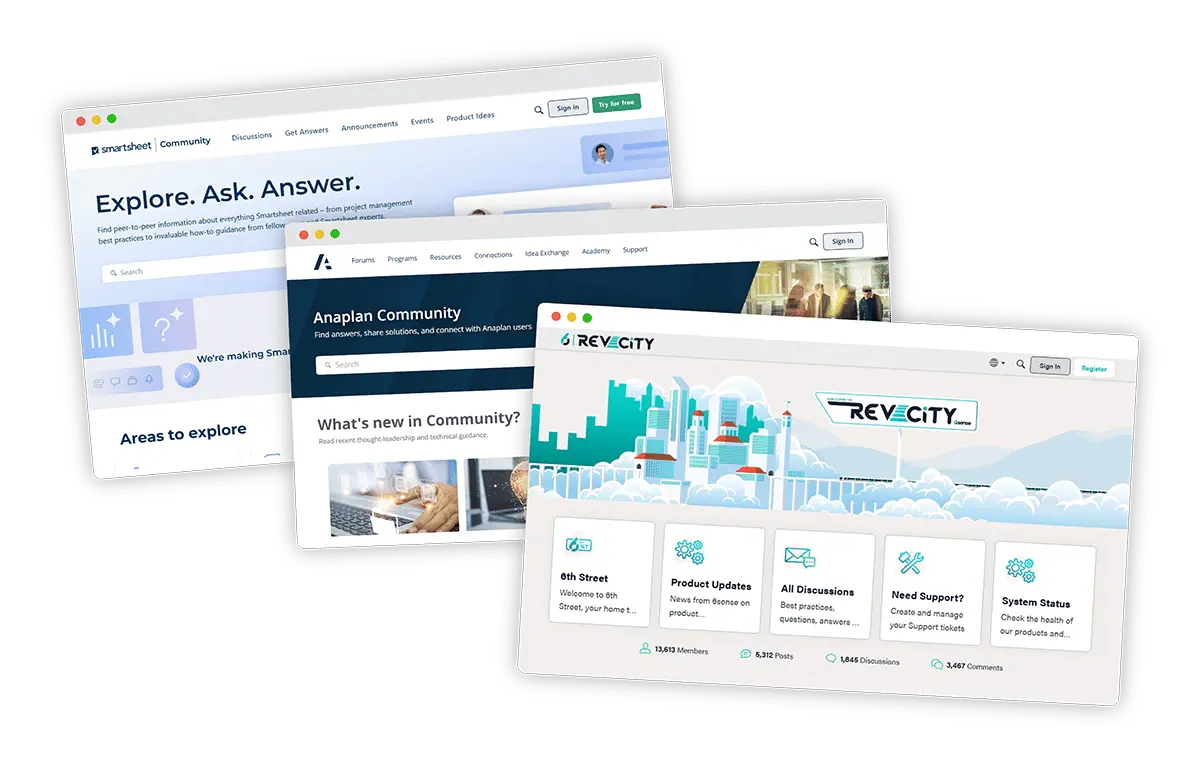
Outline Your Software Budget
Online community platforms range from free to enterprise-level pricing. Before you dive into your search, clarify exactly how much you want to spend on your new software. Don’t forget to account for costs beyond the platform itself, such as implementation costs or consulting fees.
Free tools like social media groups may seem appealing, but often come with limitations in customization, data ownership, and support. Premium platforms, although they require more of an upfront investment—both financially and in terms of leadership approval—often offer more power, control, and support, which can reduce the staff time and resources needed to make them successful.
Request Personalized Demos
With your goals, budget, and list of priority features in hand, do further research on any of the options on this list that stand out to you. Explore the providers’ websites and compare user reviews on sites like G2 or Capterra. Then, request live demos to see your top choices in action. Come prepared with questions, and use the demo to discuss exactly how the software could support your organization’s goals.
Boost engagement with the #1 online community platform: Higher Logic.
Prioritize Ease of Use and UX
A feature-rich platform will do more harm than good if it’s too complex for your team or members. As you make your final decision, consider how easy each software is to navigate. A clean, accessible interface helps drive participation, keeps members coming back, and reduces the time your team spends on support and troubleshooting.
The easier it is for users to find what they need and contribute meaningfully, the more active your community will be. In particular, you should consider:
- Admin experience: Can your team easily manage content and users?
- Member experience: Is the interface simple to navigate and engage with?
- Mobile accessibility: Can users access the platform from their phones?
It’s also a good sign if your community platform vendor practices what they preach by providing an online community for YOU as the customer (like our Higher Logic Users Group, HUG), to ask questions, learn from other customers, and get advice for addressing challenges or undertaking new initiatives.
Making the Most of Online Community Software
Choosing the right online community platform isn’t a one-size-fits-all decision. What works for a large organization may not suit a small team of creators. The key is understanding your unique goals, limitations, and the kind of experience you want to create for your members.
As the digital landscape continues to evolve, so will the tools we use to foster connection. That’s why flexibility, scalability, and reliable support matter just as much as advanced features. The most successful communities aren’t built overnight, but with the right foundation, you’ll be better equipped to create meaningful engagement and long-term value.
Looking for more insight or advice on building a thriving online community? Check out these additional resources:
- #1 Association Community Software: Higher Logic Thrive. Explore our top recommendation in more detail and browse Higher Logic Thrive’s features, case studies, and platform FAQs.
- How Bitdefender Increased Traffic and Engagement with Higher Logic Vanilla. Read the success story of one of our B2B customers to discover how they used Higher Logic Vanilla to increase online community usage and engagement.
- What Makes Online Communities Successful? 15 Community Examples. Not sure what you want your community to look like? Draw inspiration from these successful online community examples.
- The Support Community Handbook: Tips for Creating Customer Resources. No matter which platform you choose, it’s up to you to build a helpful resource library. Download our free eBook to learn best practices.
With Higher Logic, Bitdefender increased member activity by 121%.
Ready to build your own thriving online community? Request a Higher Logic demo.

